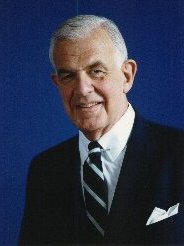- Tom Foley
Infobox Officeholder
name =Tom Foley

imagesize =184px
small
caption =
order =57th
office =Speaker of the United States House of Representatives
term_start =June 6 ,1989
term_end =January 3 ,1995
president =George H. W. Bush Bill Clinton
predecessor =Jim Wright
successor =Newt Gingrich
order2 =Member of the U.S. House of Representatives
fromWashington 's 5th district
term_start2 =January 3 ,1965
term_end2 =January 3 ,1995
predecessor2 =Walt Horan
successor2 =George Nethercutt
order3 =25thUnited States Ambassador to Japan
flagicon|United States flagicon|Japan
president3 =Bill Clinton George W. Bush
term_start3 =November 19 ,1998
term_end3 =April 1 ,2001
predecessor3 =Walter Mondale
successor3 =Howard Baker
birth_date =March 26 ,1929 (age 79)
birth_place =Spokane, Washington
death_date =
death_place =
nationality =
party =Democratic
spouse =Heather Strachan Foley
relations =
children =
residence =
alma_mater =Gonzaga University University of Washington
occupation =
profession =Law
net worth =
religion =
website =
footnotes =Thomas Stephen Foley (born
March 26 ,1929 inSpokane, Washington ) is an American politician of the Democratic Party, having served as the Speaker of the U.S. House of Representatives andambassador toJapan . He served in theUnited States Congress from 1965 to 1995. His thirty-year career in Congress was notable for its length and for his steady climb up the ranks of the Congressional and party leadership. However, his defeat in the 1994 Congressional elections made him the first sitting Speaker since 1860 not to win re-election to Congress.Early life and legal practice
In 1946, Foley graduated from the Jesuit-run
Gonzaga Preparatory School in Spokane. He is an Eagle Scout. [cite web| url =http://www.scouting.org/Media/FactSheets/02-516.aspx | title = Fact Sheet Eagle Scouts| publisher = Boy Scouts of America| accessdaymonth = 03 March | accessyear = 2008] He went on to attend theGonzaga University in Spokane and theUniversity of Washington inSeattle , the latter awarded him aBachelor of Arts degree in 1951. In 1957, he earned a law degree from the same university.Following law school, Foley entered private practice. In 1958, he began working in the Spokane County prosecutor's office as a deputy prosecuting attorney. Foley taught at
Gonzaga University Law School (inSpokane, Washington ) from 1958 to 1959. In 1960, he joined the office of the State of WashingtonAttorney General .In 1961, Foley moved to
Washington, D.C. , and joined the staff of theUnited States Senate Committee on Interior and Insular Affairs as assistant chief clerk and special counsel, in which capacity he served until 1963.Congressional service
In 1964, Foley won the Democratic nomination for
Washington's 5th congressional district , which was based in Spokane. He faced 11-term Republican incumbentWalt Horan and won by seven points, one of several Democrats elected in the gigantic Democratic landslide of that year. He was re-elected without much trouble until 1978, when he barely defeated conservative activist Rick James. In 1980, physician John Sonneland nearly defeated Foley, only losing by 4 points. Foley didn't face serious opposition again until 1994, even as his district became more conservative.In 1981, Foley was chosen majority whip by the House Democratic caucus and served in that capacity until 1986, when he moved up to the position of majority leader. In 1989,
Jim Wright ofTexas stepped down as Speaker of the House amid an ethics scandal, and Foley was elected to succeed him. He became the first Speaker from a state west of theRocky Mountains .Term limits
During his time in the House, Foley repeatedly opposed efforts to impose
term limits on Washington state's elected officials, winning the support of the state's voters to reject term limits in a 1991 referendum. However, in 1992, a term limit ballot initiative was approved by the state's voters.Foley brought suit, challenging the constitutionality of a state law setting eligibility requirements on federal offices. Foley won his suit, with federal courts declaring that states did not have the authority under the U.S. Constitution to limit the terms of federal officeholders.
However, in Foley's bid for a 16th term in the House, his Republican opponent,
George Nethercutt , used the issue against him, repeatedly citing the caption of the federal case brought by Foley, "Foley against the People of the State of Washington." Nethercutt vowed that if elected, he would not serve more than three terms in the House (but ultimately served for five terms). Foley lost in a narrow race that coincided with the Republican electoral triumph of 1994. While Foley had usually relied on large margins in Spokane itself to carry him to victory, in 1994 he only won Spokane by 9,000 votes while Nethercutt did well enough in the rest of the district to win overall by just under 4,000 votes.Foley became the first sitting Speaker of the House to lose his bid for re-election since
William Pennington (R-New Jersey ) in 1860 to Nehemiah Perry. He is now commonly viewed as a political casualty of theterm limits controversy of the early 1990s.Electoral history
Here is a chart of the vote in his elections. There are subtotals for the city of Spokane, rural Spokane County, and a Spokane total, as this is the main part of the 5th Congressional District.
Later career
In 1997, Foley was appointed as the 25th U.S. Ambassador to
Japan by PresidentBill Clinton , in which capacity he served until 2001. Foley was awarded an honoraryCompanion of Honour by the government of the UK.Foley was a
Washington delegate to the2000 Democratic National Convention .On
July 9 2003 ,Washington Governor Gary Locke awarded the Medal of Merit, the state's highest honor, to Foley.He was North American Chairman of the
Trilateral Commission .References
External links
*CongBio|F000239
Wikimedia Foundation. 2010.
